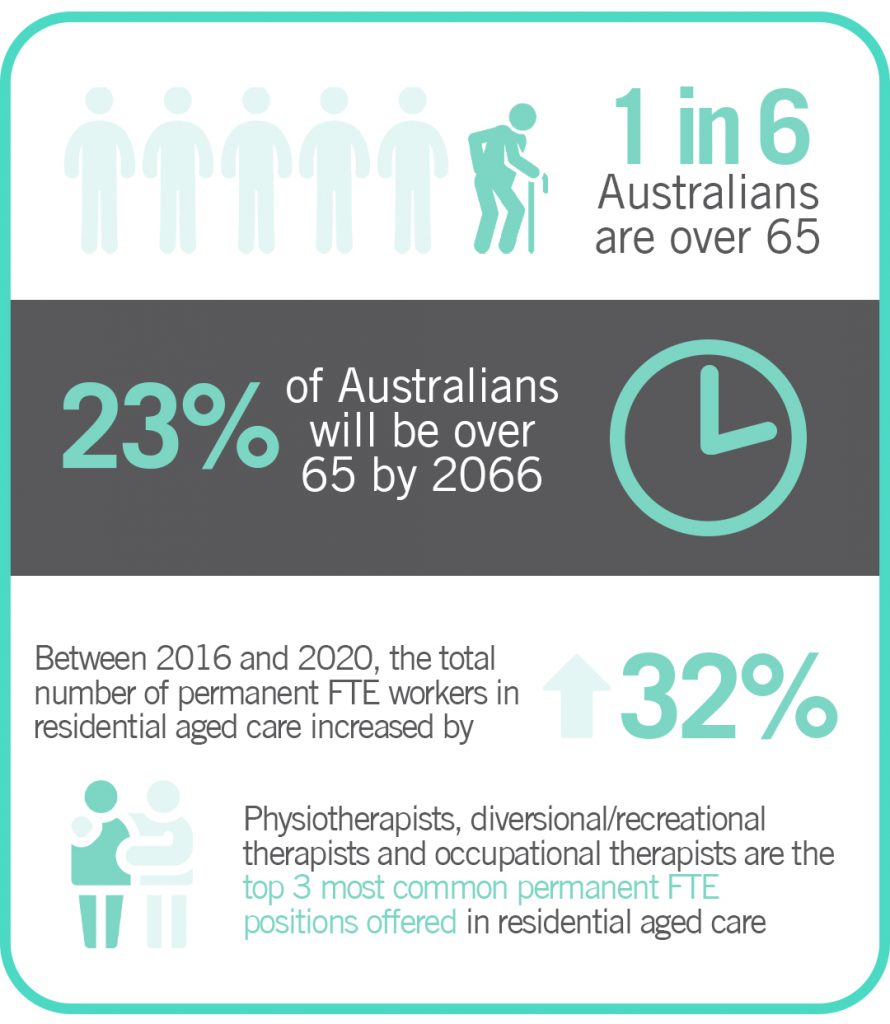Would you like a career that makes a difference to vulnerable people’s lives? Have you considered using your skills and training to benefit the lives of older Australians?
With a booming job sector, varied career prospects, and many different roles on offer, working in aged care may be the perfect choice for your next move.

Australia is an advancing society with good access to medical care, meaning that we’re enjoying higher life expectancy rates each year. While this is welcome news, it also means that we have a growing number of older people in our society. The Australian Institute of Health and Welfare graph below indicates how the older population will grow over the next 75 years.

Thanks to this ageing population, a growing need for skilled staff, and lower rates of younger people entering the sector, there are now abundant opportunities for allied health specialists to transition into residential aged care roles.
We’re placing a diverse range of health professionals including dieticians, exercise physiologists, nurses, occupational therapists, osteopaths, pharmacists, physiotherapists, podiatrists, social workers and speech pathologists into rewarding, well remunerated, and varied aged care careers.
Why are so many specialists making the move to the sector for the first time? Here’s six reasons why transitioning to the aged care sector may be your best move yet.

1. Ongoing growth and professional development
It’s a mistaken yet commonly held belief that caring for older people requires few skills and that staff have limited access to career development. Due to the dynamic and complex environment of the sector and the diverse physical, mental and emotional needs of people, allied health professionals require specialised skills training, clinical knowledge, leadership skills, and the ability to work with the latest technology. Many professionals that transition into aged care must upskill to adapt, offering professional development and growth opportunities that are otherwise unavailable in private practice. These skills are highly transferable and create opportunities for advancement in a booming job sector.
2. Varied work that’s not just just ‘care’ work
When you think of working with older people, do you immediately think of domestic care duties such as changing sheets? Despite these stereotypes, in reality, there are many career paths available that involve using your skills, training and experience to work in the industry and improve quality of life without explicitly becoming a carer. You could, for example, create healthier food plans, assist with balance and movement, or design and lead programs to increase the physical health and overall happiness of older people.
3. You get to work anywhere in Australia
Have you dreamed of travelling around Australia, experiencing new places? For the restless or adventurous among us, there are ample opportunities to work almost anywhere in Australia, on a short or long-term basis. We’ve placed successful candidates all over the country, including in rural and regional areas, where they can gain meaningful experience and enjoy the benefits of working outside of metro cities. You may choose to take a shorter contract, or make a sea-change and move permanently.
4. Flexible hours
We know that flexibility is one of the most sought after workplace perks, especially for younger people and women. However, this is not always attainable in private practices. Thankfully, in the residential aged care sector, work tends to be more fluid, arranged around the needs of people. So, if you’re raising a family, undertaking further study, or simply want a better work-life balance, the chances are that you’ll find a role that suits your circumstances.
5. Job security with endless opportunities
As we’ve seen over the last two years, job security is not always guaranteed. However, the aged care sector is one of the fastest growing sectors in Australia. And, given our ageing population, working with older people will always be in demand. The Australian Government forecasts that over the next five years, there will be 179,000 job openings – or around 35,800 per year. A strong demand for future roles makes now a great time to start your transition into the sector.
6. It’s extremely rewarding
Working in a supportive team environment to support and enrich the lives of older people makes for an extremely rewarding career. While you won’t have the opportunity to always cure or reverse the health conditions of your clients, you’ll be improving their quality of life, supporting their independence, and helping them to feel valued. Not only will your clients share their gratitude for your work, you’ll also be appreciated by their family members and your colleagues.
Regardless of what kind of specialist role you take on, you’ll develop a deep sense of job satisfaction that’s hard to find anywhere else. Allied health professionals who work with older people also gain confidence, improved self-esteem and a broader perspective on life.


My team at Limelight People are currently recruiting for a number of allied health roles in the aged care sector. If you’re ready to make your move and learn about what’s on offer, please email me at jobs@limelightpeople.com.au for a confidential discussion. You may be surprised at what we can do for you.







